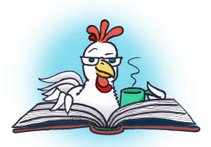[Cross-posted once again at Librarian Mom.]
My kid had a terrible tantrum last night: a real humdinger of a meltdown over a Chanukah present. She’s kind of old to have those on a regular basis, but we still get them every once in a while. She was furious, then upset, then penitent, then furious again about the consequences for her first tantrum.
After she’d calmed down some, she started recounting all the awful things that had happened to her that made this the WORST DAY OF HER LIFE.
“Wow,” I said. “It’s kind of like Alexander and the Terrible, Horrible, No Good, Very Bad Day.” I didn’t want to push the comparison, but it seemed to take her out of herself just a little to remember that other people have felt the way she did—enough that Judith Viorst wrote a whole book about a kid whose day goes so badly that he declares repeatedly that he wants to move to Australia.
Here are a few other books about emotions that might help a kid who’s stuck in her (or his) own anger or misery:
When Sophie Gets Angry—Really, Really Angry, by Molly Bang. Enraged over a sibling dispute, Molly runs and runs outside, then cries, then climbs a tree and lets “the wide world comfort her,” until her anger is dissipated and she returns to her house to play a game with her family. What I love about this book is the way the vibrant, bold, pulsating colors of Bang’s painted illustrations make it absolutely clear what Sophie is feeling. A rare nonjudgemental book about a child’s totally believable anger.
How Are You Peeling?, by Saxon Freyman and Joost Elders. This duo has created a whole series of books in which the characters are played by fruits and vegetables, cleverly carved to resemble animals and people. This one, which introduces a surprisingly broad range of emotions, is my favorite: who would have guessed that lemons and onions and even turnips could be so expressive? (I’m particularly fond of the sulky red pepper who illustrates the concept of pouting.) The illustrations, along with the jaunty rhyming text, also help keep the book from bogging down with seriousness or preachiness.
Pete’s a Pizza, by William Steig. [out of print, but available used and at many libraries.] It’s raining, so Pete can’t go outside to play with his friends. He’s miserable, but not for long: his parents start pretending he’s a pizza: they “knead” him on the kitchen table, sprinkle paper (for cheese) and checkers (for pepperoni) on him, and drop him on the couch to be “baked.” All the while his expression modifies from full-bore crabbiness to mildly-amused-in-spite -of-himself to total giggling enjoyment, until he leaps off the counter (where’s he’s about to be “sliced”) and runs away, only to be caught and tickled. My daughter hates to be cheered up or jollied out of what she’s feeling, but sometimes she likes reading about it, and your child might too.
